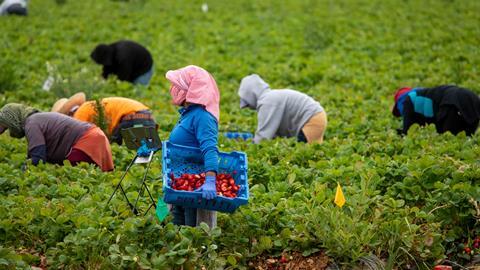Acknowledging the problem of worker exploitation is half the battle for fresh produce companies, according to Shayne Tyler who specialises in helping firms combat the scourge of modern slavery
Tempting as it may be to consider slavery an unconscionable historical aberration, so-called “modern slavery” is very much a reality in 2023, and any industry heavily reliant on low-paid, seasonal workers is likely to be a target for exploitation. Shayne Tyler, whose company TylerBladon Practical Ethics specialises in helping companies across the world to identify and root out such labour abuses, has been focused on the issue ever since a 2000 episode of BBC’s Panorama exposed the exploitation of illegal workers at the fresh produce importer he worked for in Cambridgeshire, UK.
In the UK, we’re frequently seeing stories of worker shortages, crops being left unpicked and even empty shelves in the supermarkets. Was this predictable?
Shayne Tyler: Many people saw the supply issues in the UK coming. I think you need to go back to the Immigration Act. On 1 May 2015, the prime minister at the time, David Cameron, conducted a review of the immigration system. There were a lot of negative stories about immigration figures at the time and the government were going to move to a single enforcement body and reduce immigration to the “tens of thousands”. But no one anticipated that we would then vote to leave the EU. So when the vote came through, suddenly the Immigration Act was no longer about non-EU, but non-UK citizens, which creates a completely different picture. People were saying then that there was going to be a labour shortage, hence why the seasonal worker scheme was so rapidly thrown together. It was totally predictable. What wasn’t predictable was how complex we would make that worker scheme.
Given the shortages of labour, one might assume workers would perhaps be in a stronger position…
ST: When there’s a shortage of labour, you have desperation. So a shortage of labour gives an opportunity to those who do not have the right to live and work here, to find work. We therefore see an increase in that sort of worker to fill the gap, and usually in the background there’s somebody exploiting them. At the moment, there’s a shortage of labour in the UK, so there is an increase in illegal workers. And because we’ve got restricted numbers coming in through the seasonal worker scheme, from faraway lands, there are also people willing to even pay to get into the scheme, so there is further exploitation there.
At 40,000-45,000 people the seasonal worker scheme is important to the industry, but it is nowhere near the level that really makes a big difference. The vast majority are on EU settled status, and that can be difficult because you’ve got people skirting around immigration rules, applying for visas and getting caught up in renewals. And all of this complexity creates a perfect breeding ground for those that wish to exploit because they can hide in it.
Given the challenges, is there much hope for schemes like Fairtrade to have a proper impact?
ST: I’m a great believer in schemes like Fairtrade. Any business or supply chain that signs up to doing the right thing is in a better position. The reality of the problem is, to paraphrase [management consultant] Peter Drucker, “doing things right is efficiency, but being effective is doing the right thing”. To explain that in terms of ethics, we should always do the right thing, but some businesses feel backed into a corner where they are left with little option.
Doing things right, in a way that is efficient at driving the exploiters out of our industry, that’s almost impossible. When I was supplying for my previous company, Operation Fort was in the news, and West Midlands police found that the UK’s largest ever modern slavery network had been operating in Birmingham. The police’s budget was nearly twice that of the company I worked for, and I was working with 54 different countries. So realistically, it’s just not possible.
What we’ve got to get better at is targeting where we have the biggest impact. If I’m a procurer of produce, I know that my biggest risk is minimum wage workers and how they are recruited into the UK – that’s going to be my biggest challenge. There are probably three things I need to look at: how they’re recruited, how they’re paid, and how they’re treated. But we’ve almost flooded ourselves with so many other checkboxes. We’re not in a position today where we’re actually really having any impact because we’re asking businesses to do so much. And they’re not actually looking at the area they could have an impact in.
Where do you start with the companies you assist?
ST: With the clients I now help, knowing they’ve got a problem is half the battle. And if around 2 per cent of the nation is working illegally, as the figures suggest, then we’ve all got a problem. The second thing is, what are you going to do about it? So we need to identify any process where money is involved and where the vulnerable are. It’s about process. If I’m recruiting workers overseas, that can be perfectly fine, as long as the process is fully understood and I know where my vulnerabilities of people and process are, and where there is access to money. And if I then target my resources there, I can have an impact. If I try and do everything, then I’ll have a problem.
It’s important not to judge a company on whether or not there is an issue. In health and safety, you don’t judge a business on whether they’ve had an accident. You judge them on whether they’ve had the same accident again or whether they’ve put mitigations in place. If we begin working together better and more collaboratively, we can start having more of an impact.




